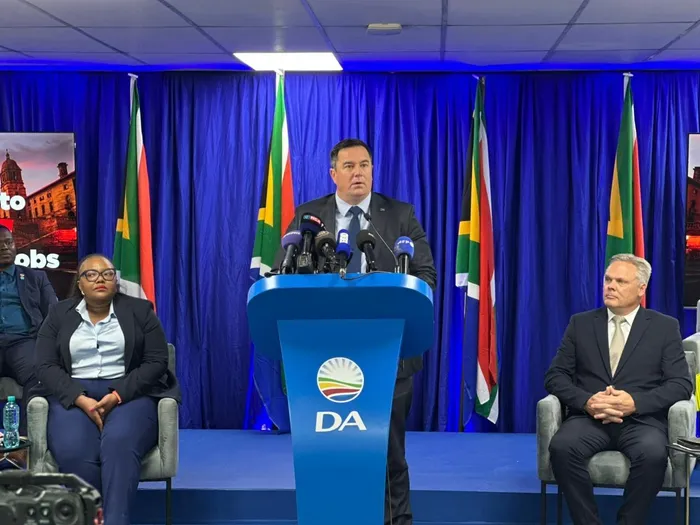Steenhuisen slams ANC policies as ‘job killers’, unveils plan to do away with transformation

DA leader John Steenhuisen addresses the media in Johannesburg, calling for the scrapping of BBBEE, Employment Equity, and the Expropriation Act.
Image: Timothy Bernard/African News Agency (ANA)
The Democratic Alliance (DA) has announced reform proposals aimed at empowering state-owned entities (SOEs), which it claims offer a better alternative to BBBEE, employment equity, and the Expropriation Act - policies it insists must be scrapped.
Speaking at a media briefing in Johannesburg on Monday, DA leader John Steenhuisen said the three acts are major obstacles to economic growth.
“BBBEE and racial quotas have failed, and together with expropriation without compensation, create an environment that deters investment, growth and job creation for the majority of South Africans,” Steenhuisen said.
He blamed the policies for discouraging investment in the country.
“These policies are simply not fair. They don't help the millions of South Africans ... who just need the government to get out of the way. These policies must go.”
Steenhuisen said the DA is not against transformation, but argued that BBBEE has failed ordinary South Africans.
“The only way South Africa will transform is through fair, inclusive alternatives that can help lift poor South Africans out of poverty and onto the social mobility ladder,” he said.
“We need to free up the economy so that South Africans grow their own businesses, creating millions of jobs in the process. The only empowerment South Africa needs is more jobs. With more jobs and a growing economy, many of our other problems will be solved.”
He said the government must replace BBBEE and employment equity with policies that create opportunities based on need and merit, rather than race or political connections.
Although the DA is part of the government it is calling on to implement these changes, its demands are clearly aimed at the ANC, the leading party in the Government of National Unity (GNU).
“Red tape must be slashed, and SMMEs freed from suffocating bureaucracy and crushing labour laws,” Steenhuisen said.
The DA, the largest partner in the GNU, has long viewed the three policies as problematic and has opposed several key ANC initiatives since the coalition was formed.
Despite repeated tensions - and threats to withdraw - the DA has chosen to remain in the GNU, claiming it is committed to fighting corruption and promoting economic growth and job creation.
Steenhuisen claimed that DA ministers have already begun implementing reforms within their departments, in contrast to ANC counterparts.
“Fix the energy crisis by breaking Eskom's monopoly over electricity generation by creating a truly competitive energy market. Introduce competition and investment into generation and distribution. Ring-fence municipal electricity revenue to maintain and reinvest in our crumbling infrastructure. No more bailouts. No more blackouts,” he said.
Steenhuisen said the third reform is to repair and modernise rail, ports, and digital infrastructure.
“Our ports are ranked among the worst in the world. The government needs to urgently concession freight rail and port terminals, ending Transnet's stranglehold,” he said.
According to him, South Africa must become a “world-class export economy - not one where goods rot on the docks”.
“Fourth. Reform public spending towards growth. Bailouts to state-owned entities have cost R310 billion. Enough is enough,” he said.
He added that the government must stabilise debt, cut waste, and eliminate ghost employees.
“Public money must build infrastructure and provide frontline services, not bankroll incompetence,” Steenhuisen said.
He said the fifth reform focuses on fixing local government.
“Coalition chaos, corruption, and collapsed service delivery cannot continue. We're championing a new law to stabilise councils. This bill will set minimum thresholds for political parties to get a seat in council,” he said.
He called on the government to protect and reinvest revenue from services directly into infrastructure, while also welcoming private sector participation in struggling municipalities.
The sixth reform, Steenhuisen said, is to restore the rule of law.
“It is now urgent that the government establish a new Anti-Corruption Commission - a Scorpions 2.0 to fight corruption.”
Steenhuisen said police corruption must be tackled through lifestyle audits for senior police officials.
“Implementation of the DA’s Rural Safety Plan, working together with community policing units,” he said.
He argued that the six reforms would build a “superhighway to growth and prosperity”.
“They will create an economy where your surname doesn't determine your future – where every South African can earn, build, and thrive.
“This is not fantasy. This is what we're already doing in the Western Cape, Mngeni, Midvaal, and every municipality where the DA governs,” Steenhuisen said.
In May, IOL News reported that the DA filed papers in the Western Cape High Court challenging the Expropriation Act, calling it “unconstitutional, both substantively and procedurally”.
DA federal council chairperson Helen Zille said the party is seeking a court order to nullify the Act in its current form.
“During the sixth administration, the DA firmly rejected the Act, believing that no government in a democratic country should possess such sweeping powers to expropriate property without compensation,” Zille said.
“We have not forgotten that the apartheid government used similar powers to forcibly remove communities from their land, often with inadequate compensation or none at all. This history teaches us that true redress requires protecting property rights, ensuring that no government is ever given unchecked expropriation powers again.”
President Cyril Ramaphosa signed the Act into law on January 23.
The legislation allows for the expropriation of land and other property for public and specified purposes.
However, a ruling on the DA’s legal challenge remains pending.
simon.majadibodu@iol.co.za
IOL Politics